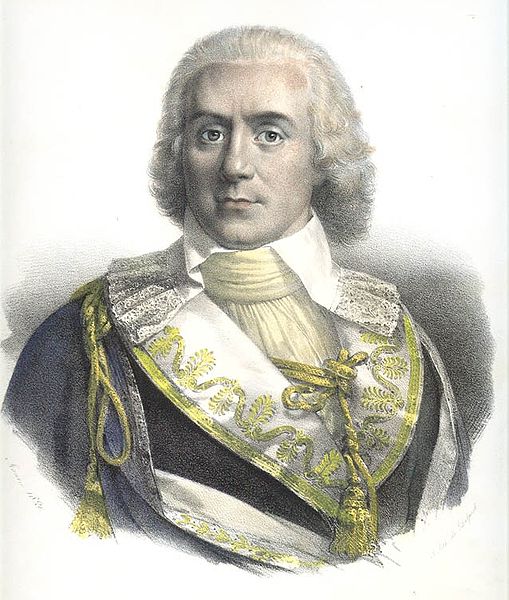<Back to Index>
- Economist Harold Joseph Laski, 1893
- Painter Émile Jean-Horace Vernet, 1789
- Lead Member of the French Directory Paul François Jean Nicolas, vicomte de Barras, 1755


Paul François Jean Nicolas, vicomte de Barras (30 June 1755 – 29 January 1829) was a French politician of the French Revolution, and the main executive leader of the Directory regime of 1795 - 1799.
Descended from a noble family of Provence, he was born at Fox-Amphoux, in today's Var département. At the age of sixteen, he entered the regiment of Languedoc as a "gentleman cadet". In 1776, he embarked for French India. After an eventful voyage, he reached Pondicherry and contributed to the defence of that city during the Second Anglo-Mysore War, a siege which ended in its surrender to Great Britain on 18 October 1778. On the release of the garrison,
Barras returned to France. After taking part in a second expedition to
the region in 1782-1783, he left the army and spent the following years
in relative obscurity. At the outbreak of the Revolution in 1789, he advocated the democratic cause, and became one of the administrators of the Var. In June 1792 he took his seat in the high national court at Orléans. Later in that year, on the outbreak of the French Revolutionary Wars, Barras became commissioner to the French Army, which was facing the forces of Sardinia in the Italian Peninsula, and entered the National Convention as a deputy for the Var. In January 1793 he voted with the majority for the execution of King Louis XVI. However, he was mostly absent from Paris on missions to the regions of the south-east of France. During this period, he made the acquaintance of Napoleon Bonaparte at the siege of Toulon (his later clash with Napoleon made him downplay the latter's abilities as a soldier: he noted in his Memoirs that the siege had been carried out by 30,000 men against a minor royalist defending
force, whereas the real number was 12,000; he also sought to minimize
the share taken by Bonaparte in the capture of the city). In 1794, Barras sided with the men who sought to overthrow Maximilien Robespierre's faction. The Thermidorian Reaction of 27 July 1794 made him rise to prominence. In the next year, when the Convention felt threatened by the malcontent National Guards of
Paris, it appointed Barras to command the troops engaged in its
defence. His nomination of Bonaparte led to the adoption of violent
measures, ensuring the dispersion of royalists and other malcontents in
the streets near the Tuileries Palace, remembered as the 13 Vendémiaire (5 October 1795). Subsequently, Barras became one of the five Directors who controlled the executive of the French Republic. Owing to his intimate relations with Joséphine de Beauharnais,
Barras helped to facilitate a marriage between her and Bonaparte. Some
of his contemporaries alleged that this was the reason behind Barras'
nomination of Bonaparte to the command of the army of Italy early
in the year 1796. Bonaparte's success gave to the Directory an
unprecedented stability, and when, in the summer of 1797, the royalist
and surviving Girondist opposition again met the government with resistance, Bonaparte sent General Augereau, a Jacobin, to repress their movement in the 18 Fructidor Coup (4 September 1797). Barras'
alleged immorality in public and private life is often cited as a major
contribution to the fall of the Directory, and the creation of the Consulate. In any case, Bonaparte met little resistance during his 18 Brumaire coup of November 1799. At the same time, Barras is seen as a supporter of the change, one left aside by the First Consul when the latter reshaped the government of France. Since he had amassed a large fortune, Barras spent his later years in luxury. Napoleon had him confined to the Château de Grosbois (Barras' property), then exiled to Brussels and Rome, and ultimately, in 1810, interned in Montpellier; set free after the fall of the Empire, he died in Chaillot (nowadays in Paris), and was interred in the Père Lachaise Cemetery. Although a partisan of the Second Restoration, Barras was kept in check during the reigns of Louis XVIII and Charles X (and his Memoirs were censored after his death).